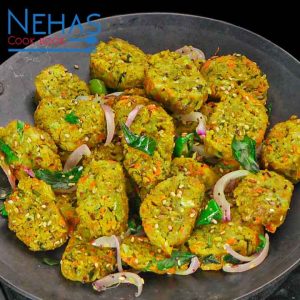
Muthiya dhokla recipe | dudhi na muthiya | muthia recipe
Ingredients
- 1 cup grated dudhi - lauki
- ½ cup grated carrot
- 1 cup chopped cabbage
- ½ cup chopped methi
- 3 green chilli
- 1 inch ginger
- 4-5 garlic cloves
- 1 tsp cumin seeds
- ½ cup coriander leaves
- ½ cup poha
- 1 cup coarse wheat flour
- ½ cup besan
- 2 tbsp oil
- Salt to taste
- ½ tsp turmeric powder
- 1 tsp red chilli powder
- 1 tsp coriander powder
- Pinch of hing
- ½ tsp ajwain
- ½ tsp garam masala
- 1 tsp fennel seeds
- 2 tbsp white sesame seeds
- 4 tbsp curd
- 1 tbsp sugar
- 1 tsp eno fruit salt
- 1 tbsp lemon juice
For tempering
- 3 tbsp oil
- 1 tsp mustard seeds
- 1 tsp cumin seeds
- 1 tbsp white sesame seeds
- 8-10 curry leaves
- 2 chopped green chilli
- 2 onion slices
- Little water
Instructions
- Wash and peel 200 grams of dudhi. Grate it using a large-hole grater. You will need 1 cup of grated dudhi. Keep it aside.
- Grate 1 medium-sized carrot. You will need ½ cup of grated carrot.
- In a mixer jar, add 1 cup of roughly chopped cabbage. Grind it using pulse mode without adding water. You will need 1 cup of chopped cabbage. Keep it aside.
- In a mixing bowl, add ½ cup of poha and wash it. Remove the water and keep it aside.
- In a mixer jar, add 2-3 green chillies, 1 inch of ginger, 4-5 garlic cloves, 1 tsp of cumin seeds, and ½ cup of coriander leaves. Grind it without adding water. The green paste is ready. Keep it aside.
- In a mixing bowl, add 1 cup of coarse wheat flour and 2 tbsp of oil. Mix the oil well into the flour.
- Then add ½ cup of gram flour (besan), ½ cup of soaked poha, 1 cup of grated dudhi, ½ cup of grated carrot, 1 cup of chopped cabbage, ½ cup of chopped methi, the green paste, salt, ½ tsp of turmeric powder, 1 tsp of red chilli powder, 1 tsp of coriander powder, a pinch of hing, ½ tsp of ajwain, ½ tsp of garam masala, 1 tsp of fennel seeds, 2 tbsp of white sesame seeds, 4 tbsp of curd, 1 tbsp of sugar, 1 tsp of Eno, and 1 tbsp of lemon juice. Mix well and bind the mixture into a dough.
- Grease your palms and take some of the mixture to shape it into cylinders.
- Boil water in a steamer. Grease the steamer plate well with oil, then place the rolls on the steamer plate.
- Leave some space between the rolls to ensure proper cooking.
- Close the lid and steam for approximately 12-15 minutes on medium-high heat.
- After 15 minutes, open the lid and insert a knife into a muthiya. If it comes out clean, the muthiya is properly steamed.
- Let it cool for 10 minutes and then cut it into pieces.
- Serve the steamed muthiya dhokla with oil and pickle masala.
Tempering:
- For tempering, heat oil in a pan. Add 1 tsp of mustard seeds, 1 tsp of cumin seeds, 1 tbsp of sesame seeds, 10-12 curry leaves, and 2 chopped green chillies. Sauté for 2 minutes.
- Add sliced onions and sauté them.
- Add the muthiya pieces and mix well with the tempering. Sprinkle some water, cover, and cook for 2-3 minutes.
- Garnish with coriander leaves and serve hot.
Notes
- Grate the vegetables using a grater with large holes.
- Adding soaked poha helps with binding and keeps the muthiya dhokla soft for a longer time.
- Using coarse flour gives the muthiya dhokla a jalidar (net-like) texture and makes it softer.
- Instead of coarse wheat flour, you can use regular wheat flour and rava (semolina).
- Curd helps keep the muthiya dhokla soft even after it cools down.
- Eno makes the muthiya dhokla fluffy and soft. You can use baking soda as a substitute.
- Steam the muthiya dhokla on high flame for 12–15 minutes.
- Cut the muthiya dhokla only after it has completely cooled down.
- Sprinkling some water helps generate steam and makes the muthiya dhokla softer.
- Muthiya dhokla taste great when it serve hot.